Disability in Childhood: A Comprehensive Case Study Analysis
VerifiedAdded on 2022/12/30
|13
|919
|84
Case Study
AI Summary
This case study examines the complexities of childhood disability, specifically focusing on Down syndrome. It explores the issues of disadvantage and oppression faced by children with disabilities, including challenges in education and child protection. The study delves into socially constructed notions surrounding disability and presents different models, such as the medical and social models, to understand diverse perspectives. Relevant policies, like the Equality Act 2010, are analyzed for their impact on promoting equality and eliminating discrimination. The case study highlights the need for support systems, well-trained educators, and inclusive environments to ensure children with disabilities receive appropriate care and opportunities. The conclusion emphasizes the importance of addressing various factors impacting these children, including education, self-advocacy, and child protection, to improve their quality of life. The study concludes by referencing several research articles related to Down syndrome and disability.
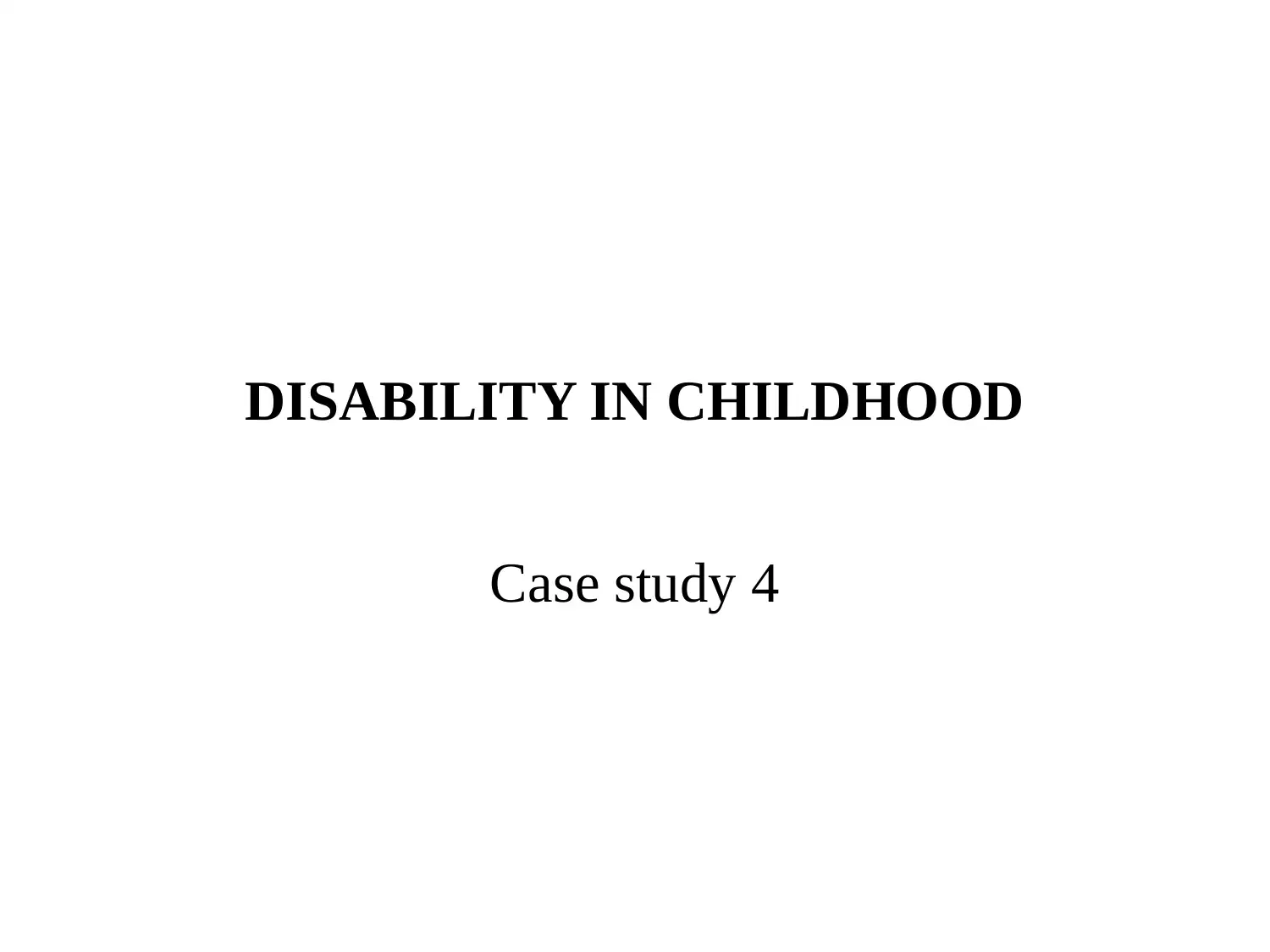
DISABILITY IN CHILDHOOD
Case study 4
Case study 4
Paraphrase This Document
Need a fresh take? Get an instant paraphrase of this document with our AI Paraphraser
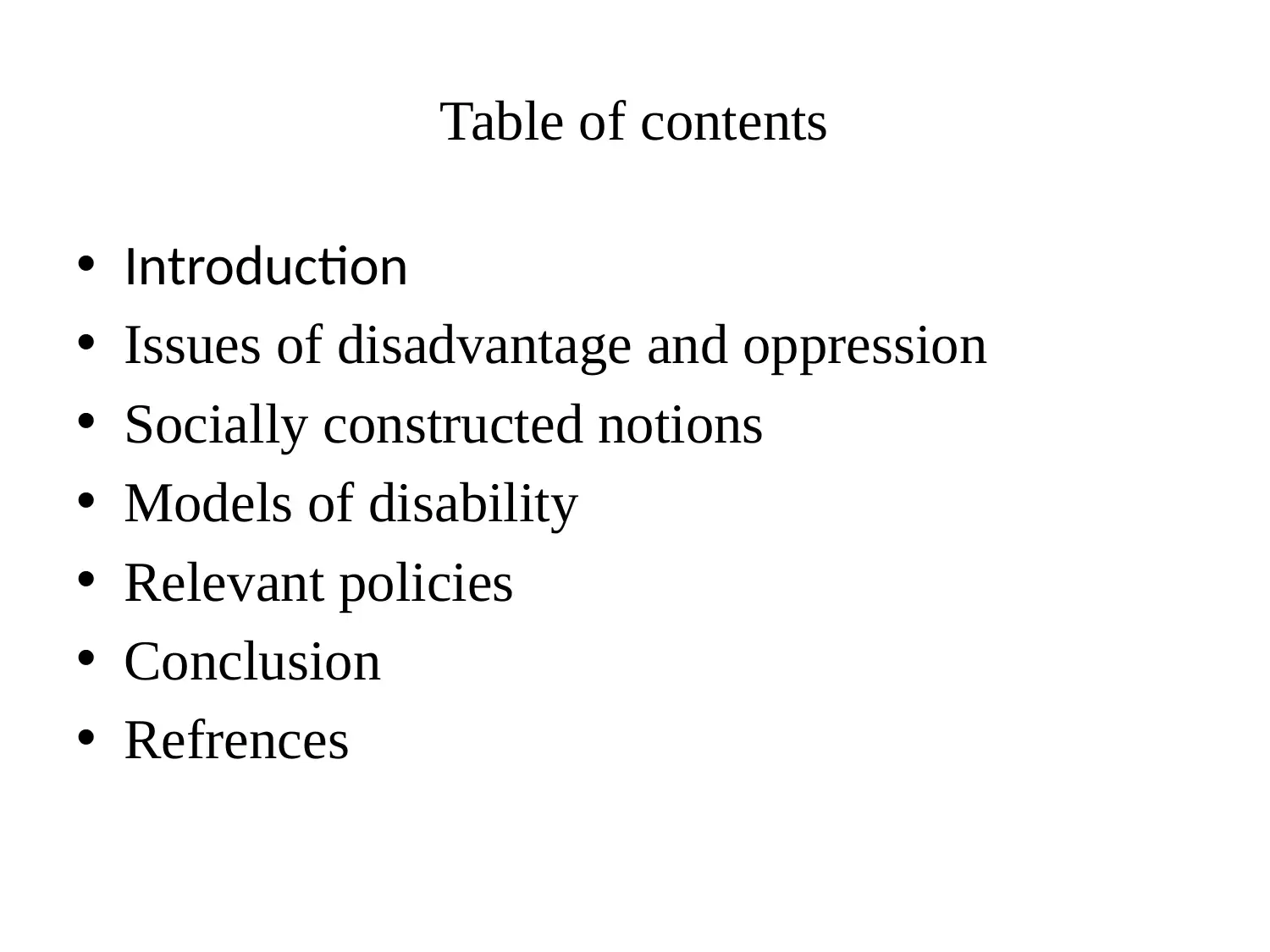
Table of contents
• Introduction
• Issues of disadvantage and oppression
• Socially constructed notions
• Models of disability
• Relevant policies
• Conclusion
• Refrences
• Introduction
• Issues of disadvantage and oppression
• Socially constructed notions
• Models of disability
• Relevant policies
• Conclusion
• Refrences
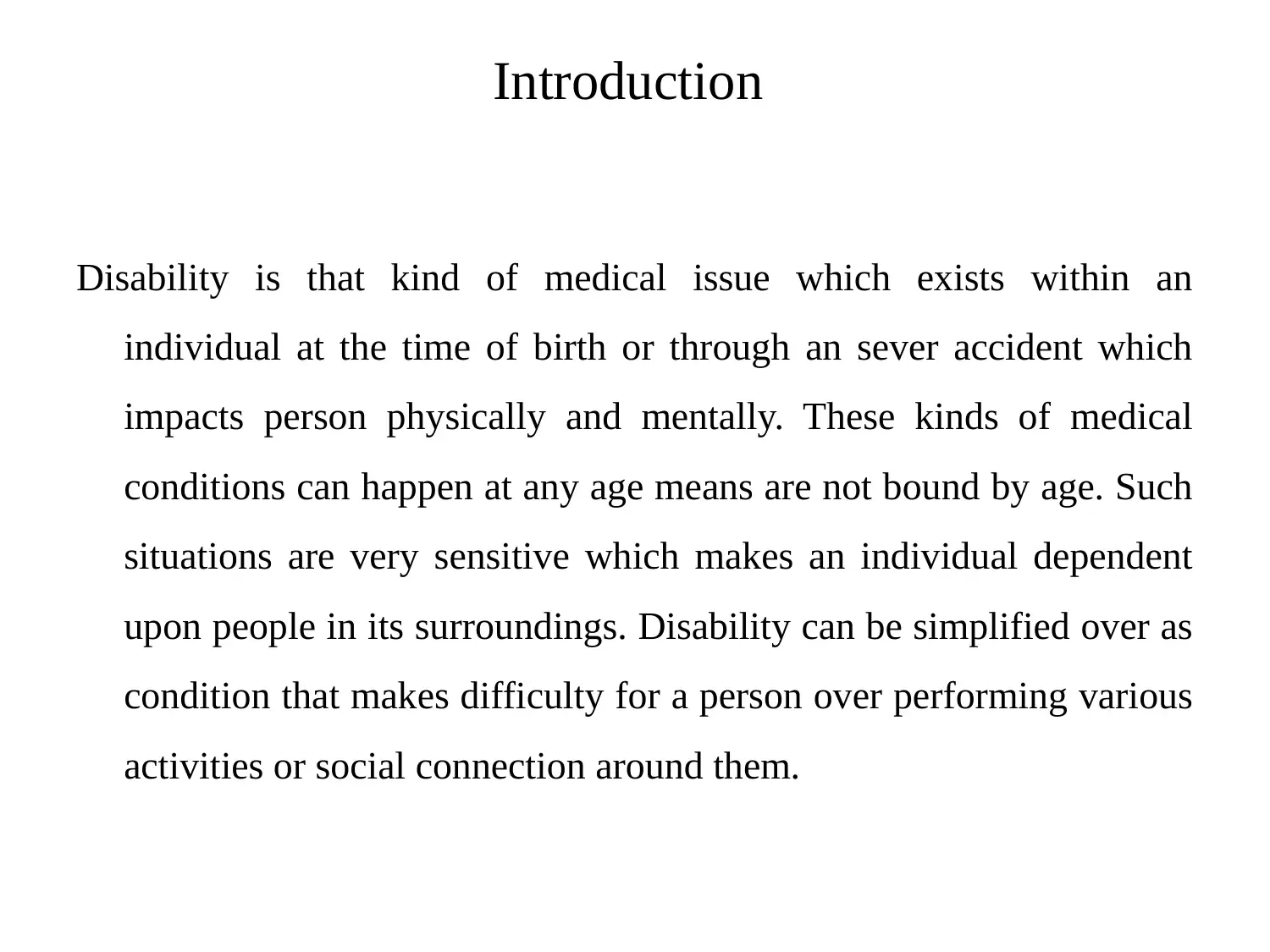
Introduction
Disability is that kind of medical issue which exists within an
individual at the time of birth or through an sever accident which
impacts person physically and mentally. These kinds of medical
conditions can happen at any age means are not bound by age. Such
situations are very sensitive which makes an individual dependent
upon people in its surroundings. Disability can be simplified over as
condition that makes difficulty for a person over performing various
activities or social connection around them.
Disability is that kind of medical issue which exists within an
individual at the time of birth or through an sever accident which
impacts person physically and mentally. These kinds of medical
conditions can happen at any age means are not bound by age. Such
situations are very sensitive which makes an individual dependent
upon people in its surroundings. Disability can be simplified over as
condition that makes difficulty for a person over performing various
activities or social connection around them.
⊘ This is a preview!⊘
Do you want full access?
Subscribe today to unlock all pages.

Trusted by 1+ million students worldwide
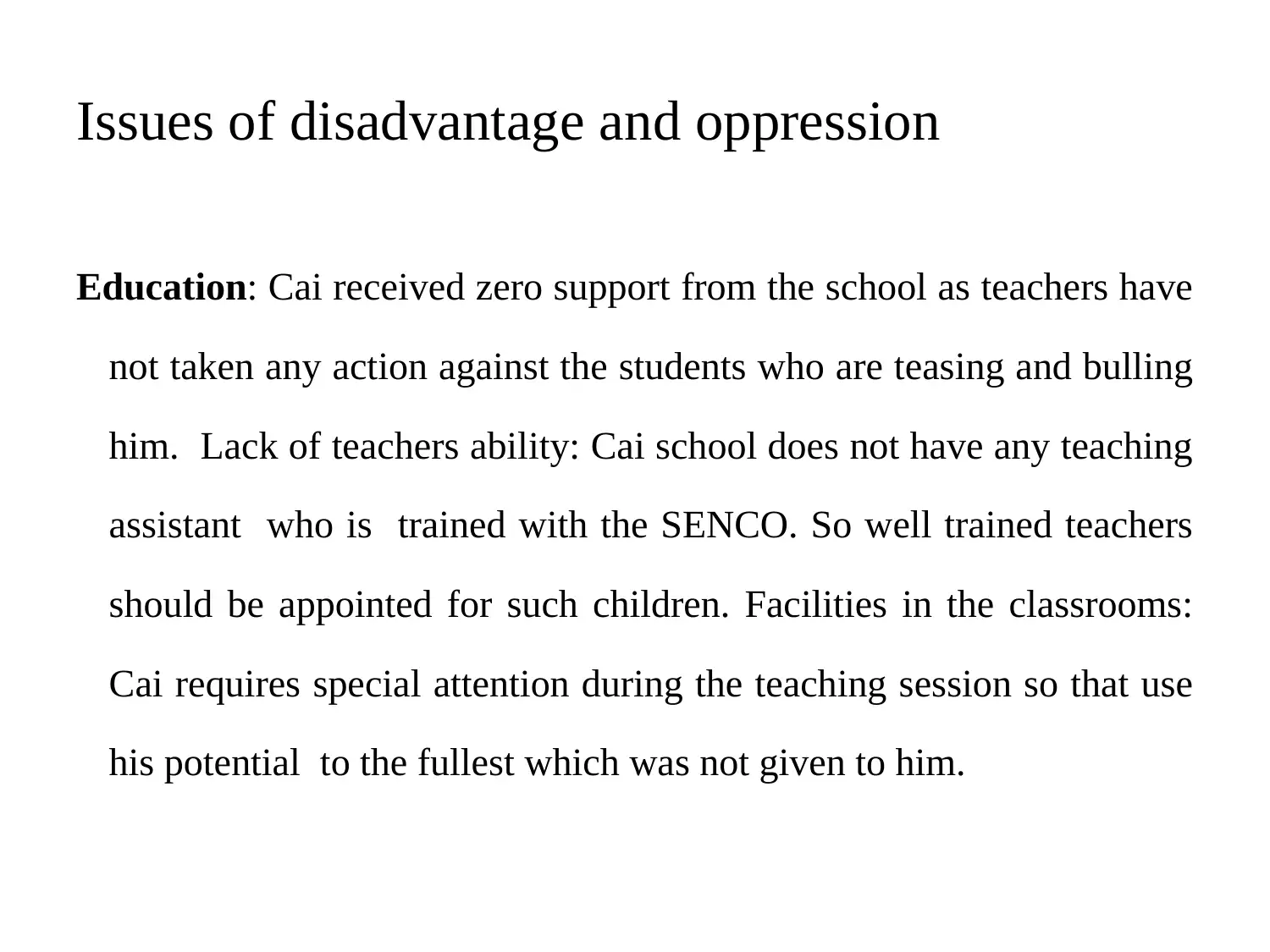
Issues of disadvantage and oppression
Education: Cai received zero support from the school as teachers have
not taken any action against the students who are teasing and bulling
him. Lack of teachers ability: Cai school does not have any teaching
assistant who is trained with the SENCO. So well trained teachers
should be appointed for such children. Facilities in the classrooms:
Cai requires special attention during the teaching session so that use
his potential to the fullest which was not given to him.
Education: Cai received zero support from the school as teachers have
not taken any action against the students who are teasing and bulling
him. Lack of teachers ability: Cai school does not have any teaching
assistant who is trained with the SENCO. So well trained teachers
should be appointed for such children. Facilities in the classrooms:
Cai requires special attention during the teaching session so that use
his potential to the fullest which was not given to him.
Paraphrase This Document
Need a fresh take? Get an instant paraphrase of this document with our AI Paraphraser
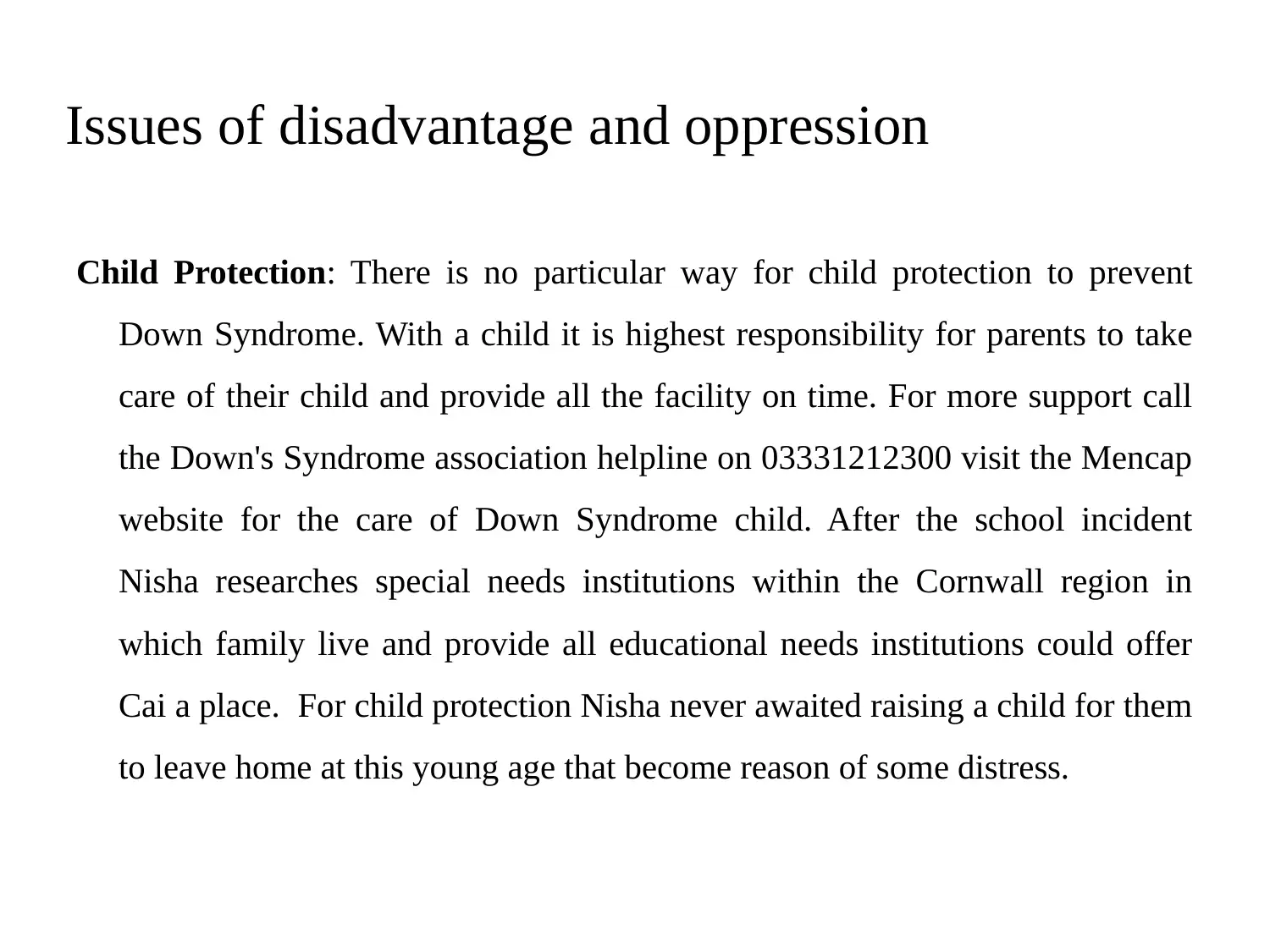
Issues of disadvantage and oppression
Child Protection: There is no particular way for child protection to prevent
Down Syndrome. With a child it is highest responsibility for parents to take
care of their child and provide all the facility on time. For more support call
the Down's Syndrome association helpline on 03331212300 visit the Mencap
website for the care of Down Syndrome child. After the school incident
Nisha researches special needs institutions within the Cornwall region in
which family live and provide all educational needs institutions could offer
Cai a place. For child protection Nisha never awaited raising a child for them
to leave home at this young age that become reason of some distress.
Child Protection: There is no particular way for child protection to prevent
Down Syndrome. With a child it is highest responsibility for parents to take
care of their child and provide all the facility on time. For more support call
the Down's Syndrome association helpline on 03331212300 visit the Mencap
website for the care of Down Syndrome child. After the school incident
Nisha researches special needs institutions within the Cornwall region in
which family live and provide all educational needs institutions could offer
Cai a place. For child protection Nisha never awaited raising a child for them
to leave home at this young age that become reason of some distress.
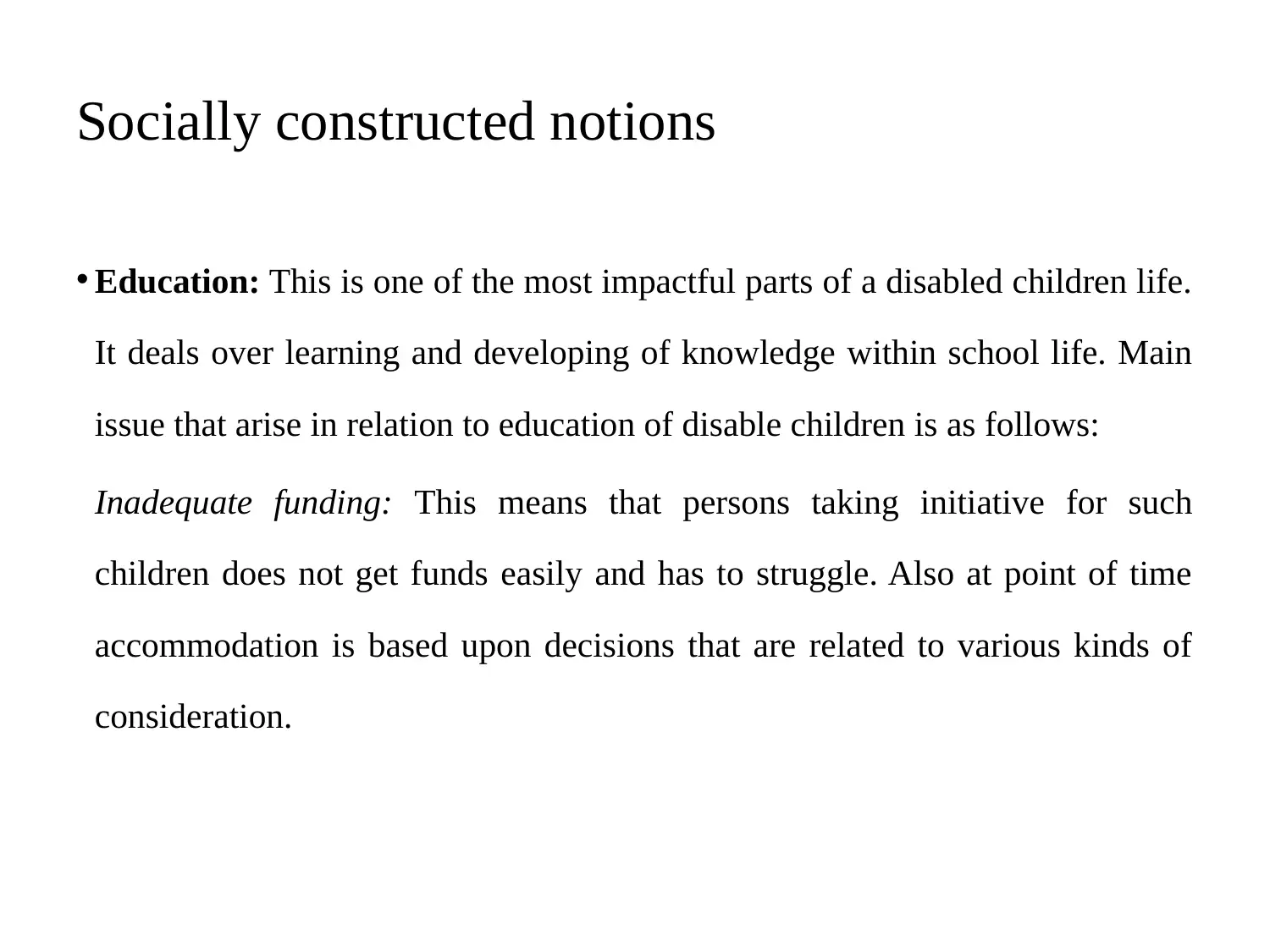
Socially constructed notions
• Education: This is one of the most impactful parts of a disabled children life.
It deals over learning and developing of knowledge within school life. Main
issue that arise in relation to education of disable children is as follows:
Inadequate funding: This means that persons taking initiative for such
children does not get funds easily and has to struggle. Also at point of time
accommodation is based upon decisions that are related to various kinds of
consideration.
• Education: This is one of the most impactful parts of a disabled children life.
It deals over learning and developing of knowledge within school life. Main
issue that arise in relation to education of disable children is as follows:
Inadequate funding: This means that persons taking initiative for such
children does not get funds easily and has to struggle. Also at point of time
accommodation is based upon decisions that are related to various kinds of
consideration.
⊘ This is a preview!⊘
Do you want full access?
Subscribe today to unlock all pages.

Trusted by 1+ million students worldwide
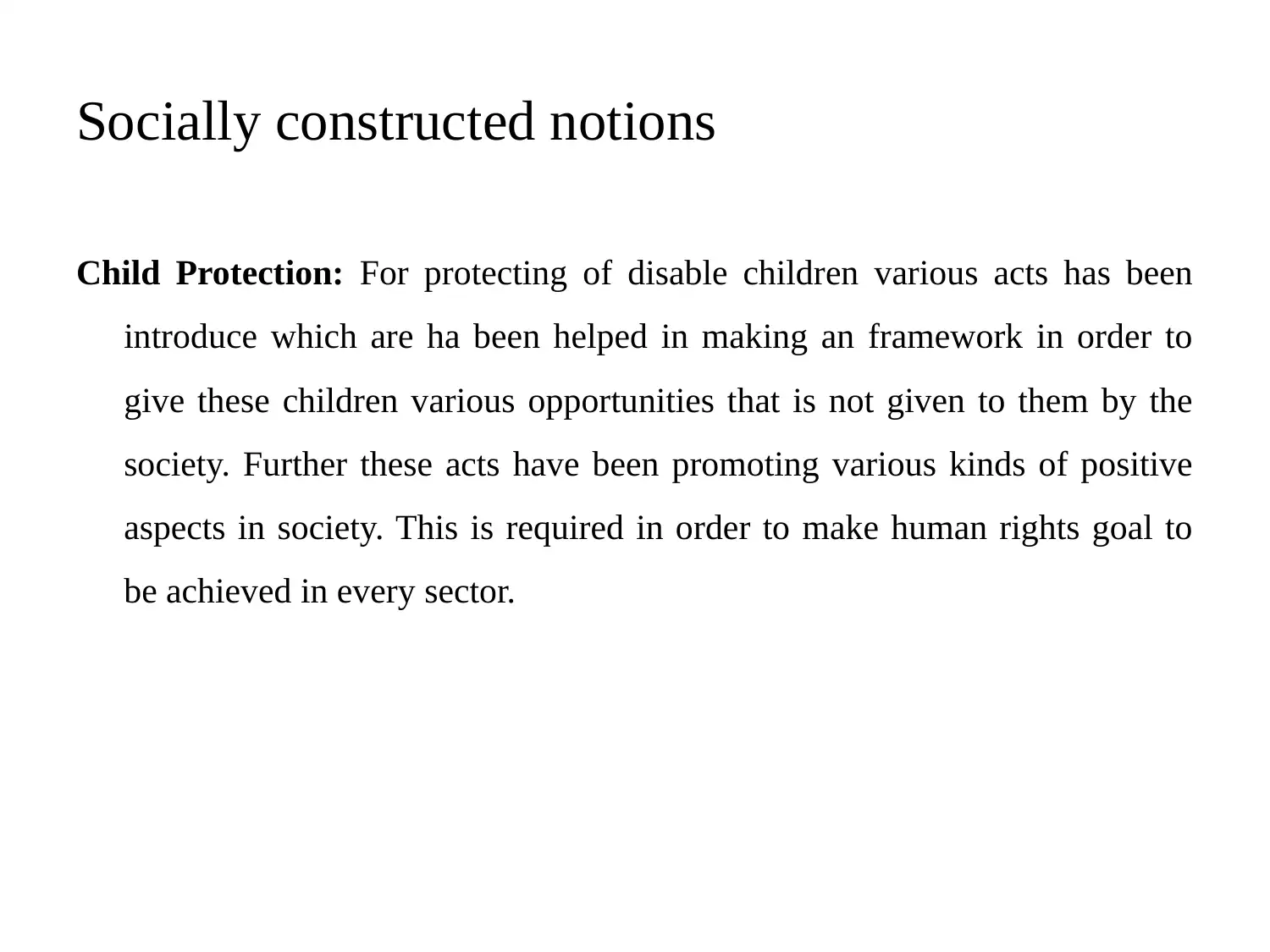
Socially constructed notions
Child Protection: For protecting of disable children various acts has been
introduce which are ha been helped in making an framework in order to
give these children various opportunities that is not given to them by the
society. Further these acts have been promoting various kinds of positive
aspects in society. This is required in order to make human rights goal to
be achieved in every sector.
Child Protection: For protecting of disable children various acts has been
introduce which are ha been helped in making an framework in order to
give these children various opportunities that is not given to them by the
society. Further these acts have been promoting various kinds of positive
aspects in society. This is required in order to make human rights goal to
be achieved in every sector.
Paraphrase This Document
Need a fresh take? Get an instant paraphrase of this document with our AI Paraphraser
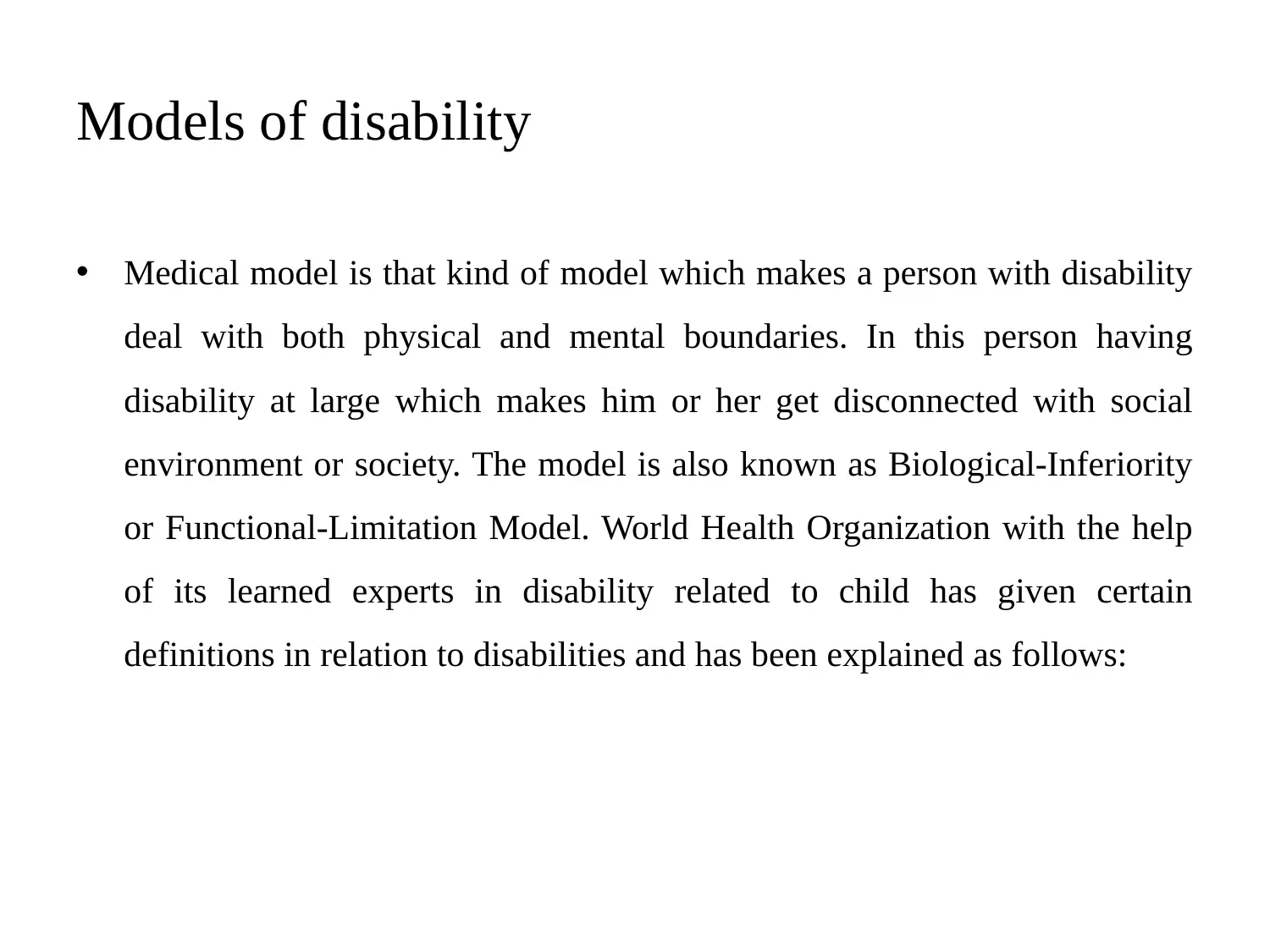
Models of disability
• Medical model is that kind of model which makes a person with disability
deal with both physical and mental boundaries. In this person having
disability at large which makes him or her get disconnected with social
environment or society. The model is also known as Biological-Inferiority
or Functional-Limitation Model. World Health Organization with the help
of its learned experts in disability related to child has given certain
definitions in relation to disabilities and has been explained as follows:
• Medical model is that kind of model which makes a person with disability
deal with both physical and mental boundaries. In this person having
disability at large which makes him or her get disconnected with social
environment or society. The model is also known as Biological-Inferiority
or Functional-Limitation Model. World Health Organization with the help
of its learned experts in disability related to child has given certain
definitions in relation to disabilities and has been explained as follows:
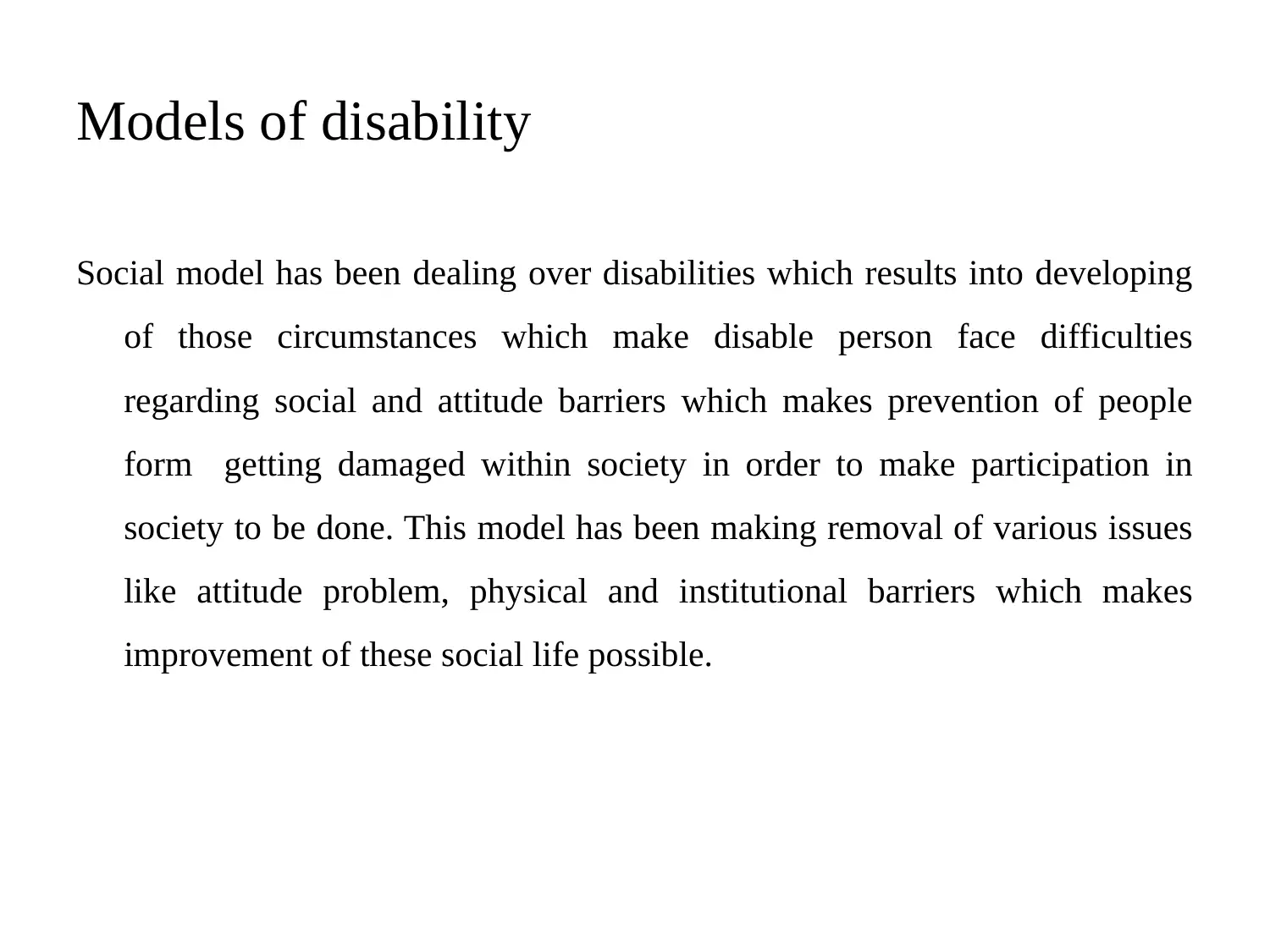
Models of disability
Social model has been dealing over disabilities which results into developing
of those circumstances which make disable person face difficulties
regarding social and attitude barriers which makes prevention of people
form getting damaged within society in order to make participation in
society to be done. This model has been making removal of various issues
like attitude problem, physical and institutional barriers which makes
improvement of these social life possible.
Social model has been dealing over disabilities which results into developing
of those circumstances which make disable person face difficulties
regarding social and attitude barriers which makes prevention of people
form getting damaged within society in order to make participation in
society to be done. This model has been making removal of various issues
like attitude problem, physical and institutional barriers which makes
improvement of these social life possible.
⊘ This is a preview!⊘
Do you want full access?
Subscribe today to unlock all pages.

Trusted by 1+ million students worldwide
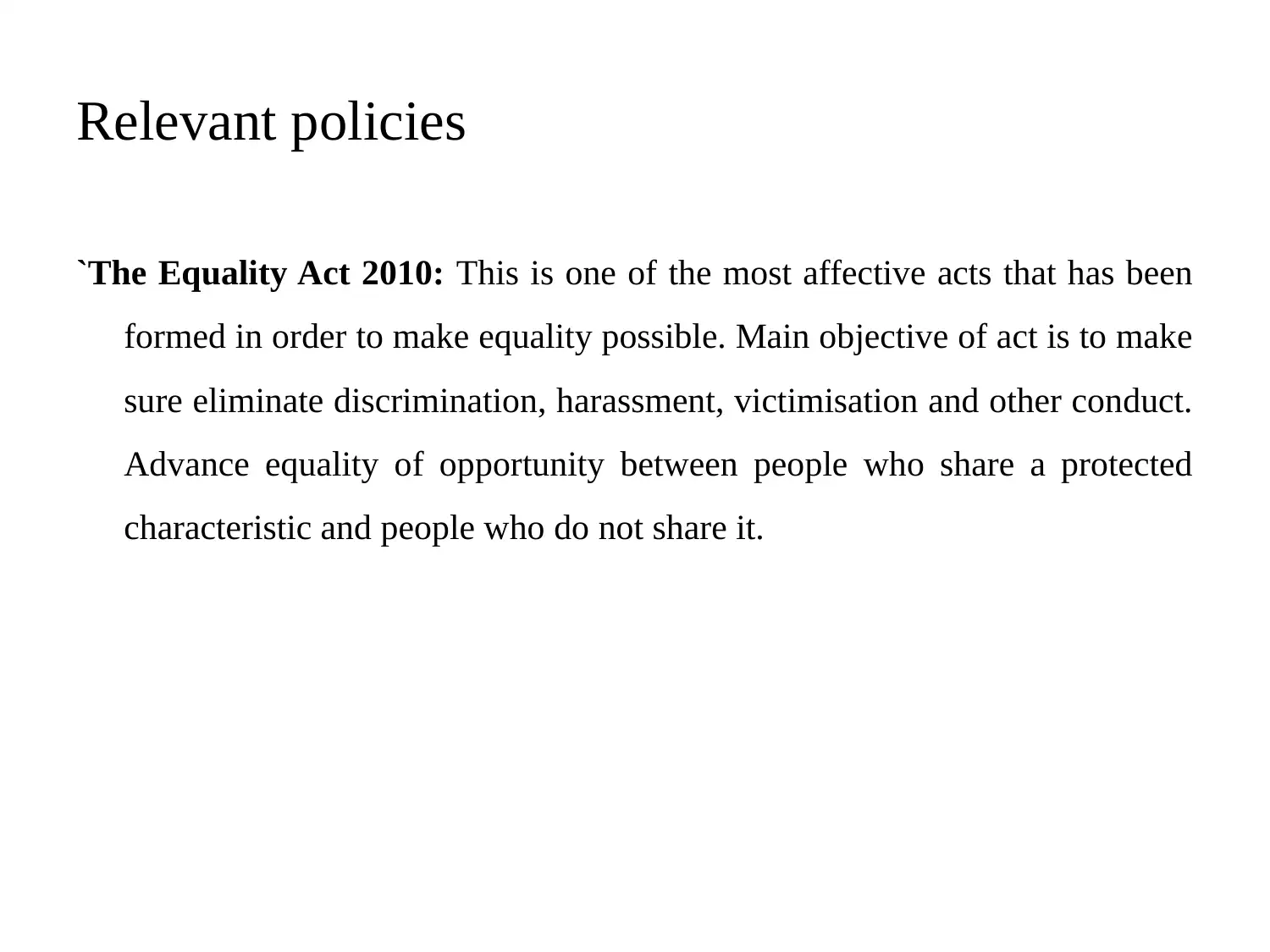
Relevant policies
`The Equality Act 2010: This is one of the most affective acts that has been
formed in order to make equality possible. Main objective of act is to make
sure eliminate discrimination, harassment, victimisation and other conduct.
Advance equality of opportunity between people who share a protected
characteristic and people who do not share it.
`The Equality Act 2010: This is one of the most affective acts that has been
formed in order to make equality possible. Main objective of act is to make
sure eliminate discrimination, harassment, victimisation and other conduct.
Advance equality of opportunity between people who share a protected
characteristic and people who do not share it.
Paraphrase This Document
Need a fresh take? Get an instant paraphrase of this document with our AI Paraphraser
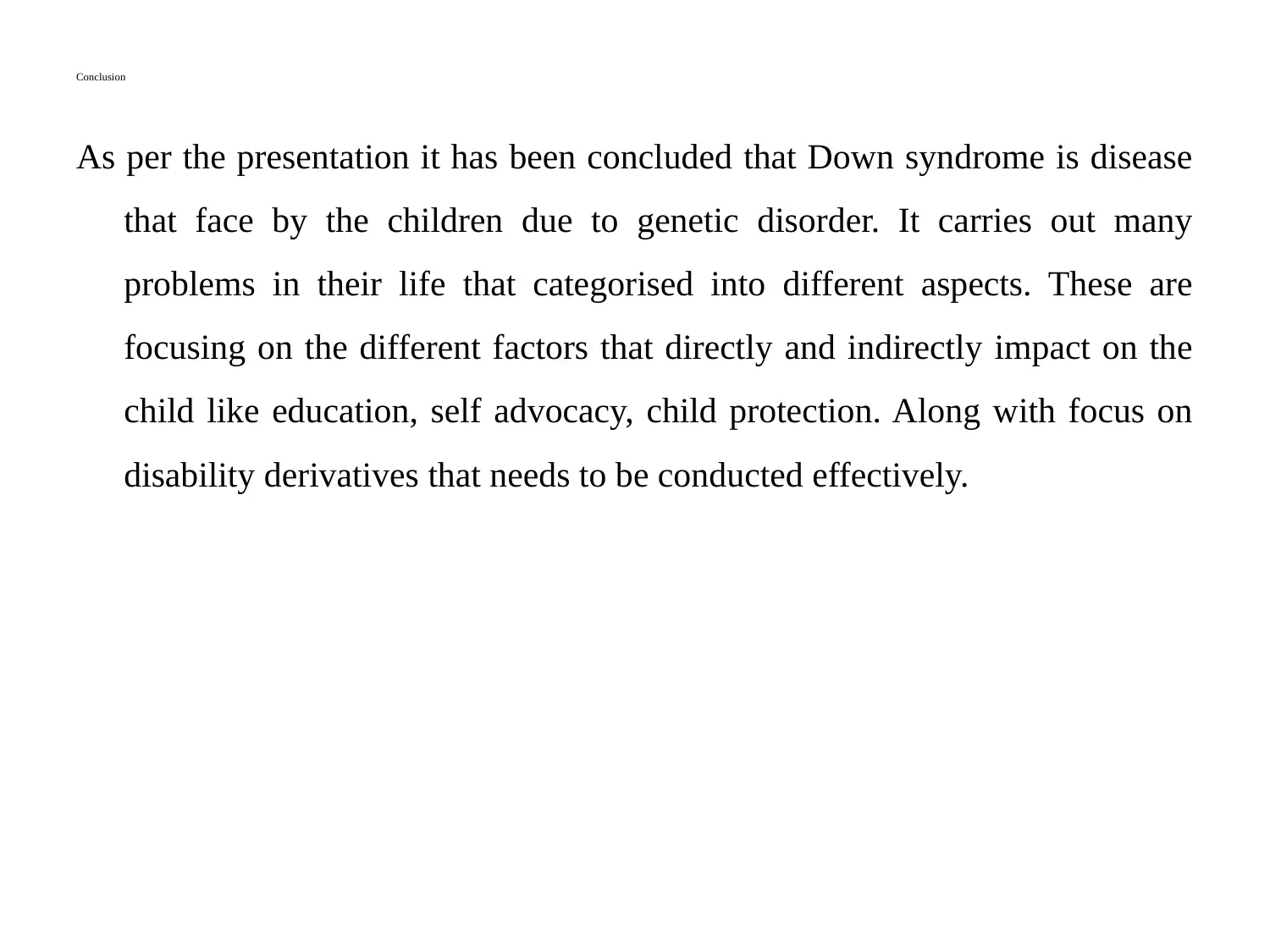
Conclusion
As per the presentation it has been concluded that Down syndrome is disease
that face by the children due to genetic disorder. It carries out many
problems in their life that categorised into different aspects. These are
focusing on the different factors that directly and indirectly impact on the
child like education, self advocacy, child protection. Along with focus on
disability derivatives that needs to be conducted effectively.
As per the presentation it has been concluded that Down syndrome is disease
that face by the children due to genetic disorder. It carries out many
problems in their life that categorised into different aspects. These are
focusing on the different factors that directly and indirectly impact on the
child like education, self advocacy, child protection. Along with focus on
disability derivatives that needs to be conducted effectively.
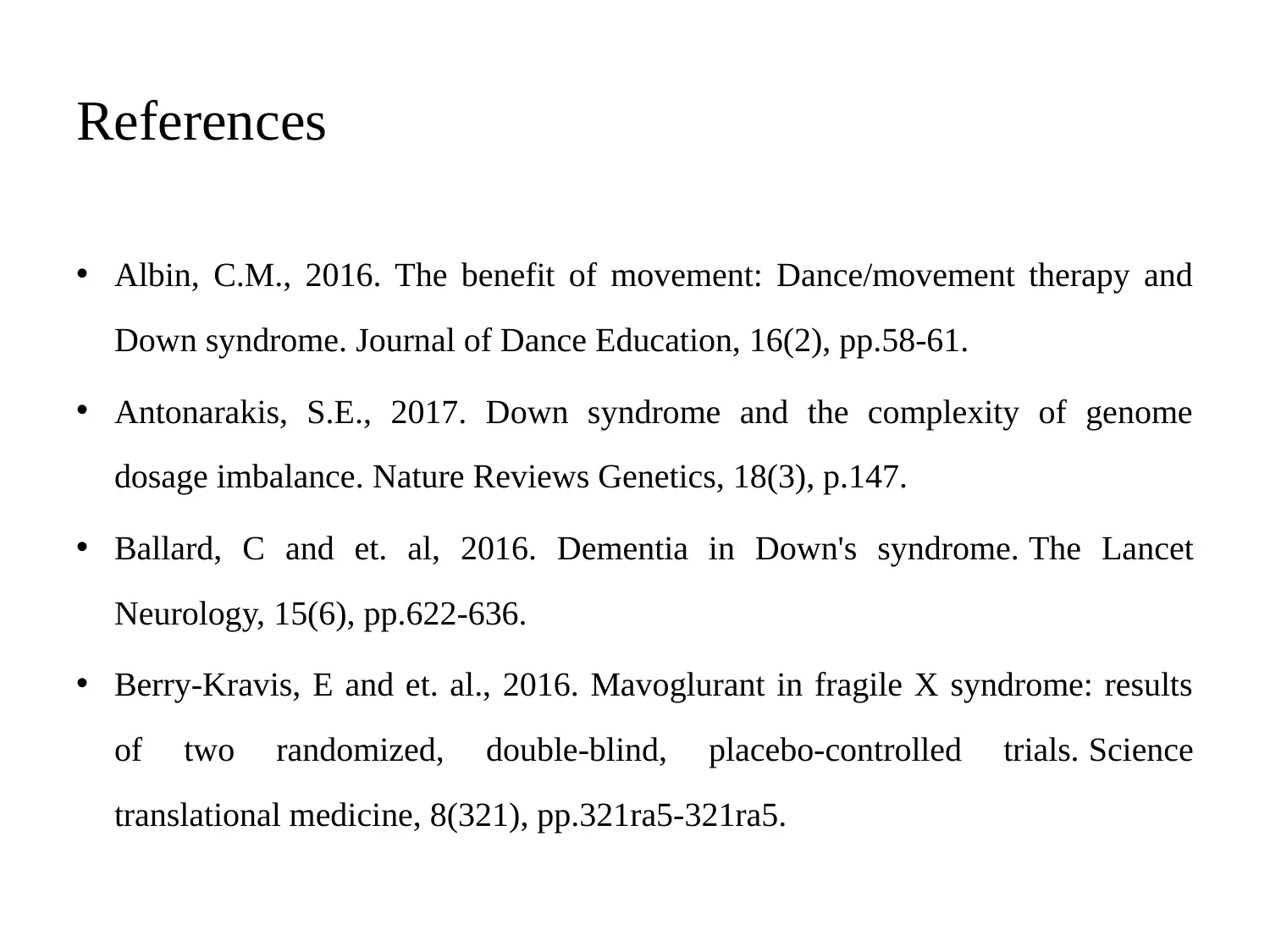
References
• Albin, C.M., 2016. The benefit of movement: Dance/movement therapy and
Down syndrome. Journal of Dance Education, 16(2), pp.58-61.
• Antonarakis, S.E., 2017. Down syndrome and the complexity of genome
dosage imbalance. Nature Reviews Genetics, 18(3), p.147.
• Ballard, C and et. al, 2016. Dementia in Down's syndrome. The Lancet
Neurology, 15(6), pp.622-636.
• Berry-Kravis, E and et. al., 2016. Mavoglurant in fragile X syndrome: results
of two randomized, double-blind, placebo-controlled trials. Science
translational medicine, 8(321), pp.321ra5-321ra5.
• Albin, C.M., 2016. The benefit of movement: Dance/movement therapy and
Down syndrome. Journal of Dance Education, 16(2), pp.58-61.
• Antonarakis, S.E., 2017. Down syndrome and the complexity of genome
dosage imbalance. Nature Reviews Genetics, 18(3), p.147.
• Ballard, C and et. al, 2016. Dementia in Down's syndrome. The Lancet
Neurology, 15(6), pp.622-636.
• Berry-Kravis, E and et. al., 2016. Mavoglurant in fragile X syndrome: results
of two randomized, double-blind, placebo-controlled trials. Science
translational medicine, 8(321), pp.321ra5-321ra5.
⊘ This is a preview!⊘
Do you want full access?
Subscribe today to unlock all pages.

Trusted by 1+ million students worldwide
1 out of 13
Related Documents
Your All-in-One AI-Powered Toolkit for Academic Success.
+13062052269
info@desklib.com
Available 24*7 on WhatsApp / Email
![[object Object]](/_next/static/media/star-bottom.7253800d.svg)
Unlock your academic potential
Copyright © 2020–2026 A2Z Services. All Rights Reserved. Developed and managed by ZUCOL.




